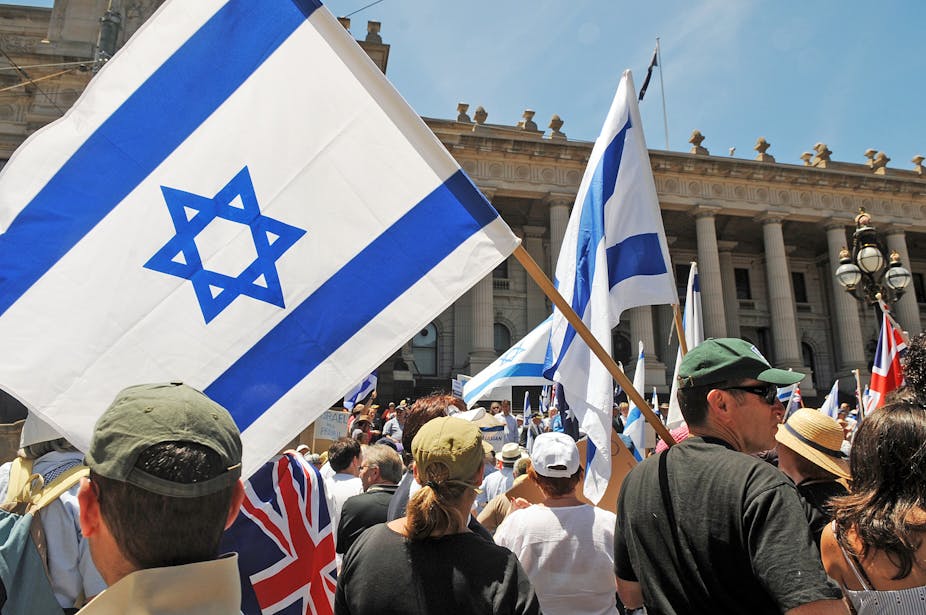On Wednesday last week, the Student Representative Council at the University of Sydney adopted a motion to boycott Israeli academics. The motion called specifically for the University to cut its current research ties with the Technion, Israel’s leading higher education technology institute, and supported the general academic boycott of Israel called for by the University of Sydney’s Centre for Peace and Conflict Studies (CPACS).
That the boycott suppresses academic freedom is clear but less obvious is that it does not promote international peace and that it is fundamentally racist. Earlier this year, The Conversation published an argument in defence of the boycott by the CPACS’ Paul Dulffill, and the issue deserves to have both sides discussed.
What is the launching of a universal boycott of Israel intended to achieve? The purported reason given by CPACS - and supported by the SRC - is that because Israeli academics reside in a country alleged to have breached international law, those smarting academics will supposedly turn around Israeli foreign and security policy.
In reality, Australian academics have minimal influence on this country’s foreign policy, and even less in Israel where national security concerns predominate. Of course, Israeli academics facing attack tend to fight back like the rest of us when pushed against the wall. The academic boycott will never be effective in its supposed objective of changing Israeli policies.
Nevertheless, Students for Palestine and CPACS supporters of the boycott might still assert that it has secondary value in Australia, perhaps because the boycott raises academic awareness here, which might percolate through to Australian foreign policy makers. So, if an implicit objective is to generate Australian antagonism, a local boycott targeting Israeli academics might supposedly influence Australian foreign policy. However, there is no evidence that this symbolic activism at the University of Sydney will influence government or swing votes in the ballot box.
On their own avowal, the members of both the University of Sydney SRC and CPACS are active in Palestine solidarity campaigns and have picked a side in an international dispute - Dulfill says that the CPACS “can hardly be expected to be neutral or disinterested”. That conflict is complex and their choice is morally questionable, but they wish to push their interests on others.
Advocacy for the university to officially engage in a boycott and to propose that it be adhered to by academics is intellectual totalitarianism, anathema to respectable universities which resist political pressure to adopt partisan policies or repress academic research. Within a learning environment the freedom to doubt, to analyse and to form and articulate an independent perspective is fundamental and the essential quality of a university.
Choosing official sides between competing nationalities, religions and races politicises a campus, alienates members of faculty staff and is toxic to faculty collegiality. Jews would be alienated but not only them. It is reminiscent of ideological purges within the Soviet and Chinese communist parties.
Let’s put this in comparative perspective: should the University of Sydney cease all collaborative research with Indonesian institutes until the Papuan self-determination movement is satisfied? What about publishing official Sydney boycott manifestos on the democratic failures in China, Fiji, Malaysia and Singapore? If the problem is military applications of technology, then it must also boycott the ANU, the universities of NSW, Wollongong, and the list goes on.
Should the University of Sydney itself be boycotted if it does not officially adopt a boycott of Israel? Should University of Sydney academics who do not individually endorse an official boycott be penalised?
It has been truthlessly suggested that the academic boycott does not affect individual academics and that the Palestine Academic and Cultural Boycott of Israel (PACBI) guidelines are clear on this. To the contrary, the PACBI guidelines do not meaningfully distinguish between Israeli academics and representatives of their institutions. Normally, any academic engaged in an international collaboration is assumed to informally represent his/her own institution. For example, an outstanding Australian-Israeli biomathematics colleague was told by a science journal that it could not publish him because of his Tel Aviv University address.
Academics are members of a social sector who typically tend to be public intellectuals and advocate for individual freedoms, liberal values and social justice. Professor Dan Avnon of the Hebrew University, who was not allowed by the Sydney CPACS to spend part of his sabbatical there, had sought to undertake individual academic work in Arab-Jewish peace studies. Shunning people who typically reach out for peaceful dialogue is an irony all can see.
Of course, the threat to academic freedom would be limited if this is the only boycott. Then, ambivalent University of Sydney staff might feel some relief: the boycott would simply be a symbolic demonstration of the University’s claim of a moral high ground. Just the Jewish state alone and no more. Sad, that is.
Australian suppression of peaceful engagement with Israeli academics could make sense only because its objective has nothing to do with peace. The long-war objective of the academic boycott is the same as the trade and diplomatic boycotts that Arab states have imposed on Israel since its inception 65 years ago.
The Friends of Palestine approach within the SRC and CPACS entails denial of any Jewish state. They are warriors in the conflict, adding fuel to its fire. There could be no more elegant demonstration for why Jews need their own country.

